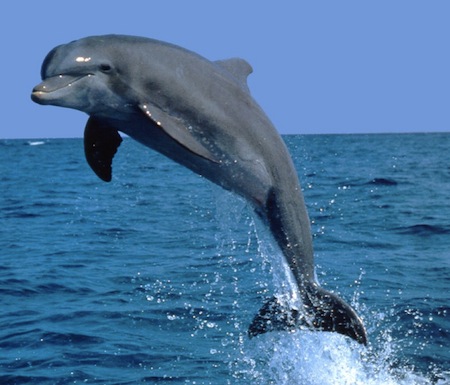LETTER: Save the Bottlenose Dolphins
 August 24, 2013
August 24, 2013
DEAR EDITOR,
Over the last few months this summer, many of us that have been out on the water have been discovering dead dolphins, stranded in and around the Bay. What at first appeared to be a local event has turned out to be more widespread. Bottlenose dolphins are being found stranded all up the mid-Atlantic coast from North Carolina to Maine, with at least 124 strandings (45 possible deaths) reported since July, a death rate seven times higher than normal.
This has led the National Marine Fisheries Service to declare a federal UME, or “unusual mortality event.” At the top of the list of possible causes is a measles-like infection called “morbillivirus,” which has been associated with previous sickness events of dolphins and seals. Since mid-summer, marine science organizations such as the Virginia Aquarium, the Marine Mammal Stranding Center in New Jersey, and Riverhead Foundation for Marine Research and Preservation in New York began documenting an increase in bottlenose dolphin strandings along the mid-Atlantic coast, and these strandings are continuing into late summer.
So far, all ages of bottlenose dolphin strandings have been reported. The NMFS reports, however, that there are no unifying necropsy findings aside from some dolphins having been found with pulmonary lesions. Preliminary testing of tissues from one dolphin indicates possibly a morbillivirus infection, although it is too early to say whether this is the cause of the UME.
CONTINUED FROM FIRST PAGE
By using the UME declaration, NMFS can leverage additional international and multi-disciplinary scientists (noted as the Working Group), as well as more funding through the National Contingency Fund. More importantly, a detailed response plan can be initiated; this can include more detailed necropsies, testing of samples for biotoxins, infectious agents, and chemicals, as well as environmental and biological evaluations and diagnostic pathology services. Hopefully, this will yield an international scientific review that will shed light on this event.
Bottlenose dolphins are routinely found in the Mid-Atlantic region at this time of year, from both the Northern and Southern Migratory Coastal Stocks. The Northern North Carolina Estuarine System Stock, mainly found in the Pamlico Sound in the summer, is also a frequent visitor to Virginia waters in summer.
Outbreaks are not entirely unusual along our coast, and happen most summer seasons. In 1987-88 more than 740 bottlenose dolphins from New Jersey to Florida were stranded (deaths of several humpback whales were also reported). Those strandings were linked to morbillivirus and algae toxins. The 35 deaths in just one recent week has accelerated the current investigative efforts.
State and Federal Agencies continue to conduct routine testing of seafood such as shrimp and crabs, searching for possible links to the UME. At this time, a link between these bottlenose dolphin strandings and any potential seafood safety issues has not been found.
NOAA and NMFS state that if you do come across a stranded dolphin, do not touch it, or allow pets to contact it. Stay at least 100 yards away. If you witness anyone harassing a sick (or well) dolphin, report it immediately to NOAA’s Office of Law Enforcement at 1-800-853-1964.
To report a live or dead stranded dolphin please contact our local stranding network authority, the Virginia Aquarium & Marine Science Center in Virginia Beach at 757-385-7576.
WAYNE CREED
Cape Charles
Letters to the Editor are welcome on any subject relevant to Cape Charles, and a diversity of opinions is encouraged. Send submissions to [email protected].




















It really saddens me to know that all of these dolphins are dying. Usually when we go boating in the summer we will see at least one pod of dolphins. This summer we have not seen any dolphins at all.
Thanks Wayne for highlighting this problem in the Wave.
Thanks, Wayne. I guess like any crime scene, the scientists want to preserve the corpse without contaminating the evidence. As witnesses to such beachings, most people want to get up close to the animal, take pictures, and even touch it. Nothing can be more harmful to an investigation into how that animal died, however. Please follow-up down the road and let us know if anything was learned from this event.
This summer I saw an amazing pod of dolphins about 1 mile off Plantation Creek. There were about 50 of them all around our boat. For anyone who has experienced these large mammals up close it is truly an exciting experience and another reason why I think Cape Charles is a great place to live.
In the past we would regularly see these pods but not in such great numbers. It would be a shame to see these beautiful creatures disappear. Thank you Wayne for providing some very useful information to the public regarding this issue.
Thanks for an informative letter. What, if anything, can we in Cape Charles do to help the situation? Do our voices need to be heard someplace?
(CNN) — The primary cause for hundreds of recent dolphin deaths along the East Coast is likely a virus, and there’s no way to stop its spread right now, federal officials say.
The virus, the cetacean morbillivirus, is similar to measles in humans or canine distemper in dogs, according to the National Oceanic and Atmospheric Administration.
Another stranding has occurred this week in Cape Charles as reported here (http://capecharleswave.com/gossip/). This brings the total strandings up over 180, and as we enter September, biologists are expecting that number to rise a bit. Please report any strandings to the Town first, but also notify Virginia Aquarium & Marine Science Center in Virginia Beach (757-385-7576)